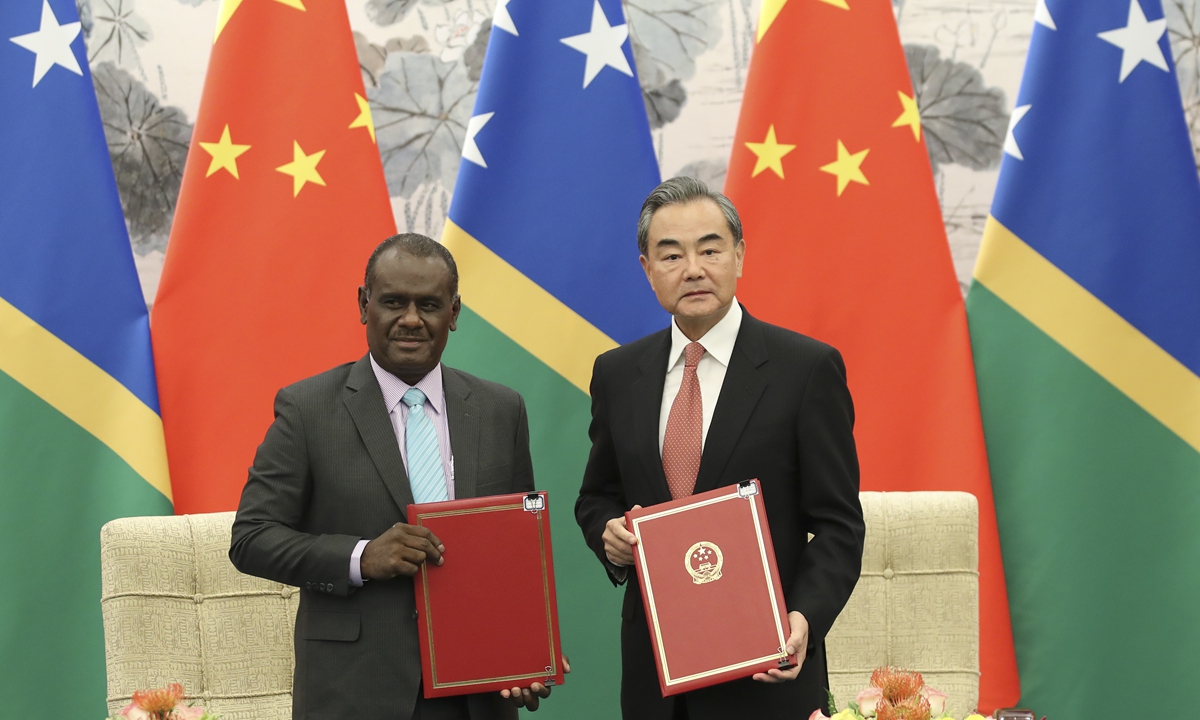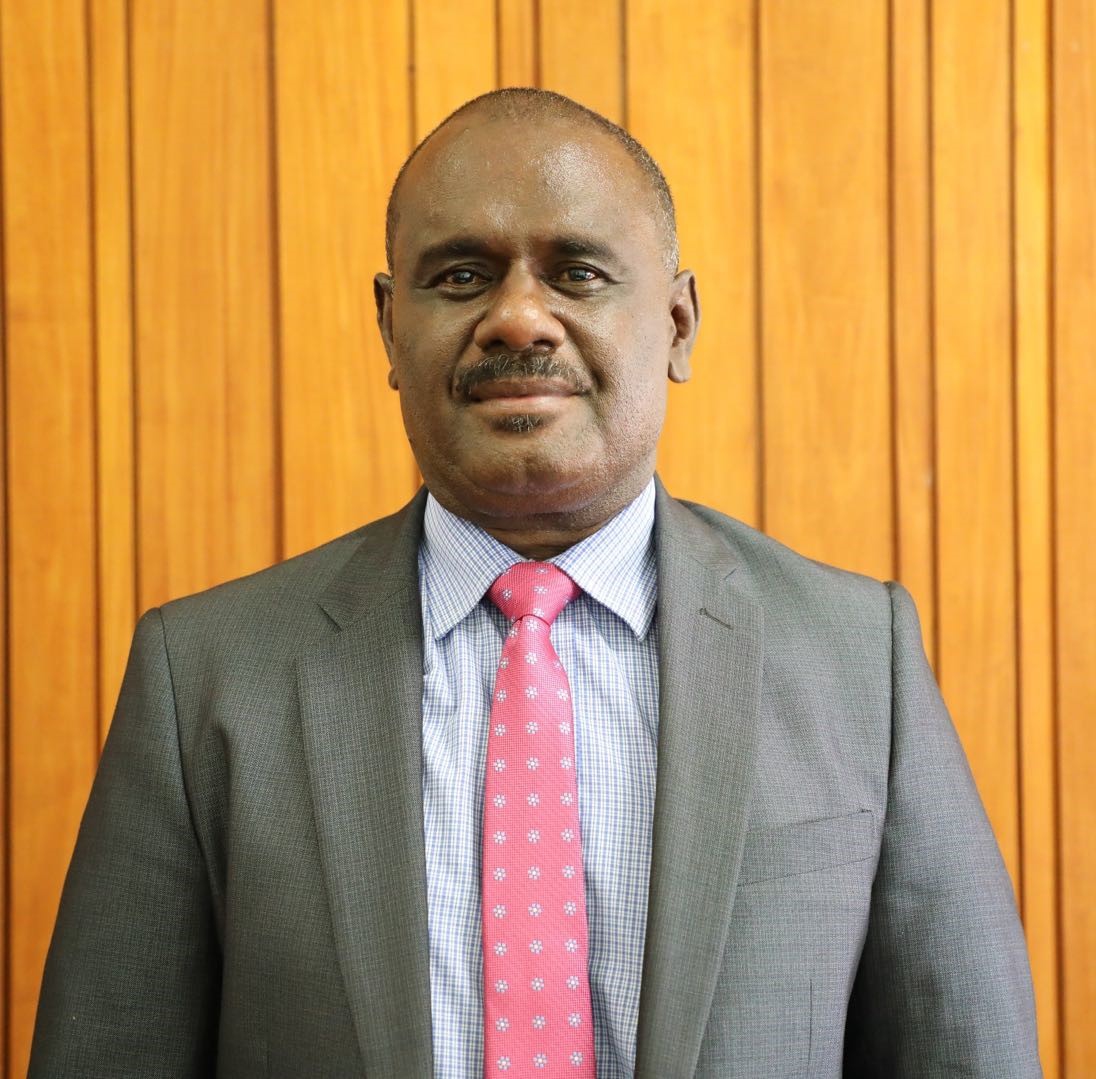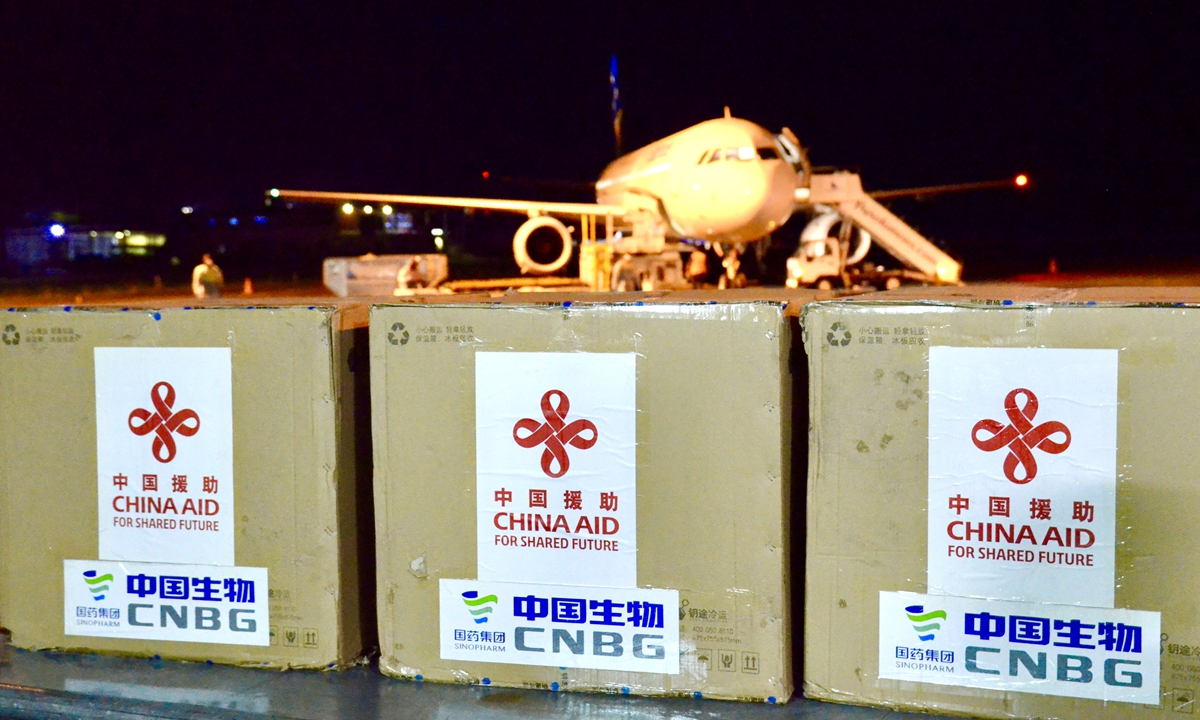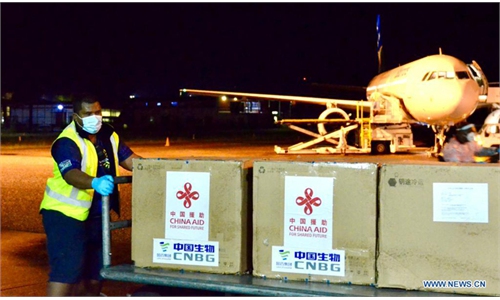IN-DEPTH / IN-DEPTH
CPC’s vision of modernizing and transforming China a feat that developing countries aspire to achieve: Solomon Islands FM
CPC’s vision of modernizing and transforming China a feat for developing countries aspire to achieve: Solomon Islands FM

China's State Councilor and Foreign Minister Wang Yi (right) and the Solomon Islands' Minister of Foreign Affairs and External Trade Jeremiah Manele sign a joint communiqué on the establishment of diplomatic relations on September 21, 2019. Photo: cnsphoto
Editor's Note:
China and the Solomon Islands officially established diplomatic relations in September 2019, ushering in a new chapter in bilateral relations. During the past two years, the two countries have witnessed strengthened ties and cooperation on all fronts. What have been the highlights in bilateral relations during the past two years? How will the bilateral relations proceed? What's the opinion of the Solomon Islands on the virus origins tracing? Global Times reporter Xie Wenting (GT) interviewed the Solomon Islands' Foreign Minister Jeremiah Manele (Manele) on these topics.
Embracing one-China policy
GT: On September 21, 2019, China's State Councilor and Foreign Minister Wang Yi and the Solomon Islands' Minister of Foreign Affairs and External Trade Jeremiah Manele signed a joint communiqué on the establishment of diplomatic relations. Could you please give us a brief introduction on the development of bilateral relations over the past two years as well as highlights in the bilateral cooperation?
Manele: Exactly almost two years ago, the Solomon Islands became 179th country to formally establish relations with China. We are indeed proud to join the rest of the world in embracing the one China policy. It is the right thing to do. And I'm pleased under the leadership of Prime Minister Manasseh Sogavare, the government of Solomon Islands is on the right side of history on this matter. The Solomon Islands' foreign policy has aligned itself with international law and UN Resolution 2758.
Within the last two years, a highway of partnerships has been constructed between the Solomon Islands and China at all levels of leadership, including in the ministerial and officials' level. We have joined 140 countries that signed up to the Belt and Road Initiative (BRI) back in October 2019. We live in an interconnected and interlinked world. So the BRI is very important for the Solomon Islands. We believe the BRI is about promoting bilateral cooperation and a common development agenda, focusing on connectivity, economic cooperation, and infrastructure development. So working with everyone is in line with the Solomon Islands' foreign policy.
I would also like to mention that the relationship that we have with China is based on common values of mutual respect for each other's sovereignty and non-interference in each other's internal affairs. The friendship between the two states has grown from strength to strength as China has become one of the Solomon Islands' major donor partners in the last 24 months.
The Solomon Islands' and China relations also strengthened under the COVID-19. China was one of the first countries to equip our system with testing capability, as well as provided medical supplies and vaccines.
China offers a new form of cooperation based in solidarity, unity and equality. Both the Solomon Islands and China have been working together over decades as members of the group of G77 and China Group. The two states also belong to the Asia and Pacific Group. China is the second largest economy in the world and the Solomon Islands' biggest trading partner. Formalizing relations opens more doors and opportunities for broadened and deeper cooperation.
In terms of the highlights of these corporations so far is China's support toward infrastructure development, specifically the building of sports infrastructure for the 2023 Pacific Games. We really appreciate China's support in this regard, as well as the support that we've been receiving under COVID-19 and in general, toward the health sector, and the offer of scholarships for students to study in China. China so far has supported us in terms of water which is also important and we are in talks with China about a water treatment facility. Its supports toward the Solomon Islands' national university is also very much appreciated.
GT: John Moffat Fugui, the first Solomon Islands' Ambassador to China, arrived in China in May and the Embassy of Solomon Islands has also opened smoothly. What will the Embassy of Solomon Islands do for the next phase in your expectation?
Manele: The Solomon Islands' First Ambassador, H.E. Ambassador Fugui, is now at his post. We have a lot to learn from China, and he remains our representative on the ground to further strengthen the relationship, especially through South-South Cooperation. The presence of diplomatic missions opens models to cooperation. We have the ambassador in Beijing and also your ambassador in Honiara. Both ambassadors are in the capitals of both states which is very important for us in terms of our relations. So we will be working closely with both of ambassadors.
We may expand our presence in China to have a trade commissioner in one of China's provinces. Currently, we are also working with China to have an air service agreement in place. We are still in the early stages of discussions on this matter.
As I've said, trade is important for us. We would like to diversify our trade with China, including productions that may require bio-security arrangements; that too is one of the embassy's agenda.
On people to people relations, we would like to see our students studying in china, and more than 100 students are now waiting to travel to China's various universities.

Solomon Islands' Minister of Foreign Affairs and External Trade Jeremiah Manele Photo: Solomon Island's Foreign Ministry
GT: The two countries have stood together and supported each other amid the pandemic. What's your expectation for the next stage of anti-pandemic cooperation between the two countries?
Manele: COVID-19 has brought China and the Solomon Islands' relations closer. China's solidarity with the world speaks of sharing resources to combat COVID-19 pandemic, providing vaccines, medical supplies, medical equipment, and strengthening other countries' health systems. I'm pleased to say that China is one of the first countries to support our testing capability. China has provided 50,000 doses of the Sinopharm vaccine and has offered more to which we are thankful.
So far, we have vaccinated a quarter of our eligible population. We still have a way to go and will keep on pushing forward. The second vice minister's special meeting on COVID-19 that Pacific Island Countries had earlier with China was a very important one. The meeting is basically a meeting of like-minded countries that identify the vaccine as a common shield against the onslaught of the virus. And I guess all of us would appreciate that no one is safe until everyone is safe.
Under the concept of sharing and caring, more wealth is unlocked. We are pleased to note that China identifies its prosperity with everyone's prosperity. I'm also pleased to see that China's supply chain remains open.
We're COVID-19 free having contained 20 imported COVID-19 cases because of the support that we received from our partners including China. The COVID-19 cooperation between the two states is really about our common understanding that no one is safe until everyone is safe. China has made allocation of support for the Pacific and continues to stand with us as we keep moving forward. The gathering continues to build a new chapter of China-Pacific relations.
GT: Some countries keep slandering and attacking China on the origins of the virus and have even fabricated the so-called report on the origins of the COVID-19, which has been opposed by the international community. What's your view on the origins tracing issue?
Manele: Today as we face the pandemic we need a united voice and deliver as one to combat the virus. It is not in our interest to politicize the issue in any way. The impact of COVID-19 on the world demands a global united front, a strong multilateral system to allow us to work together. Working together is now the key in combating the virus.
Now our priority is to get vaccinated. We understand China is a strong supporter of the World Health Organization like the Solomon Islands. We support China and the rest of the world in ensuring we get all our population vaccinated. We should keep our eyes on saving lives. The issue of origins tracing was done in July 2020, but we should not be distracted from our global effort to halt the spread of the virus.
We must be guided by science, technology, finance and strong political will to recover from the ravages of COVID-19, building back greener and better, and pursue economic and social progress.
Model for developing countries to learn
GT: This year marks the 100th anniversary of the founding of the Communist Party of China (CPC). How do you evaluate China's achievements under the leadership of the CPC. As both China and the Solomon islands are developing countries, what experience might the Solomon Islands take away from China's development?
Manele: Let me once again congratulate the CPC on celebrating its 100th anniversary. China is a country of opportunity, progress and prosperity. The CPC's vision of modernizing and transforming China is a feat for all nations, especially developing countries aspire to achieve.
Seeing is believing. Having been twice to China, I've seen firsthand the transformative development that has occurred and continued to happen. China remains the Solomon Islands' largest trading partner. We would like to explore and learn from the lessons that China has gone through, especially in terms of poverty eradication. Having a population of 400 million middle income earners out of 1.4 billion people speaks of the growing spread of wealth within China. So that experience is also one that developing countries like the Solomon Islands would like to learn from.

Chinese-developed COVID-19 vaccines arrive in the Solomon Islands on April 14. Photo: Xinhua
GT: The world is now caught between the pandemic and changes of the century. The international landscape keeps evolving in profound ways. What's your expectation for the bilateral relations in the future?
Manele: It is important that we keep strengthening a rule-based multilateral system to ensure all countries, big and small, have equal access to the global system and all do their fair share in healing the health of our planet.
The Solomon Islands' relations with China will keep growing. Testament to this is we now have cooperation with China on all fronts, in the agricultural support for taro and cassava program with tractors.
Support for the Pacific games. We are the third largest small island developing states in the Pacific, but one of the last that will acquire infrastructure that is important for our national building process, coming from a country of 700,000 people speaking some 87 different languages. So China's support for the Pacific Games is an investment for this country, especially for the youth as well as for educational institutions that are also benefiting from these huge infrastructural support programs.
China and the Solomon Islands are also cooperating in terms of the police sector. China is supporting our Royal Solomon Islands Police Force in terms of communication equipment and construction of a forensic autopsy lab.
In addition to providing COVID-19 testing equipment, the Chinese government has also supported our national referral hospital in terms of renovations. We would also like to step up our engagement and level of cooperation in terms of education, not only in terms of scholarships, but also technical training.
GT: The Chinese side warmly congratulates the government of the Solomon Islands on hosting the 2023 Pacific Games. China is now gearing up to host the Winter Olympics in February 2022. What is your expectation for the sports cooperation between the two countries in the near future?
Manele: Let me begin by congratulating China for its second place at the recent Tokyo Olympic. Talents from China are still unfolding and we would like to get a slice of that in preparing the Solomon Islands' hosting of the 2023 Games, not only for the sake of hosting the games, but also winning medals at the Pacific Games in 2023.
Hosting the Olympics is not easy. Hosting such an event places the country among the few countries that have the capability of doing so. China has that capability. China's support for the Solomon Islands' hosting of the 2023 Pacific games shows who the Solomon Islands' real friend is.
The Solomon Islands has been participating in four Futsal World Cups. With better facilities, we would also like to step up our game in soccer and other sporting events. The support we are getting from China for the 2023 Pacific games, to be specific, includes the building of a National Stadium, an Aquatic Tennis Center, a Hockey Field, a Multipurpose hall and an SINU Dorm among others. We are grateful for China. We are also thankful for PNG and Indonesia's support as well.
On the Winter Olympics that China will host, let me wish China all the best.

